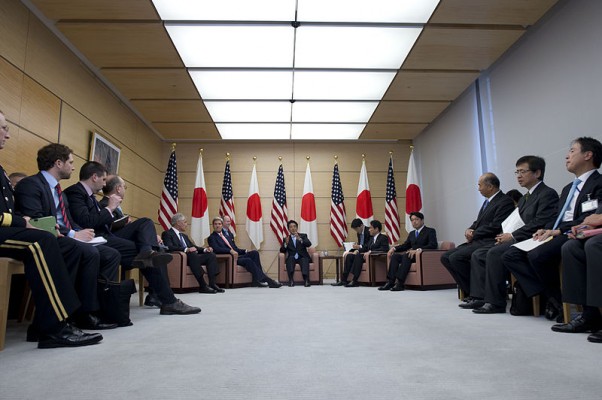
Does the US-Japan Impasse Spell Doom for TPP?
With news breaking on Wednesday of top US trade negotiators failing to reach a complete agreement with Japan over any of the most contentious trade issues, many are left feeling a sense of cynicism regarding the precious Trans-Pacific Partnership (TPP). In particular, some are quick to argue that if the US cannot reach a bilateral deal with Japan on its own, how will the US ever link arms with the other ten TPP countries? The current US-Japan impasse is unfortunate since a trade deal would act as a valuable centerpiece for US-Japan relations before Obama’s planned visit to Tokyo on April 24th. But just because US-Japan trade negotiations are in their rough patch doesn’t mean that TPP will be ultimately run off its tracks.
For one, Wednesday’s lack of progress is not surprising. It appears many are simply waking to a realization that’s been true for a long time: A US-Japan FTA would be a very big and difficult accomplishment. Japan’s status of being the world’s third largest economy and its prominence in the automobile industry makes it arguably the most contentious TPP member from the United States’ point of view. On the flip side, Japan—if it wants to abide fully to a TPP-like agreement—will have to part ways with its politically-important rice and beef import tariffs. While these sticking points will have to eventually be confronted in TPP, the love affair with import tariffs will not be so easily tamed overnight. The current US-Japan impasse is therefore not an indication of a hopeless TPP, but merely a harsh reality for how difficult and drawn-out trade negotiations usually are—even bilateral ones.
The formidable obstacles remaining between the US and Japan also mean it would be wise for both sides to not raise the starting bar too high. Trade negotiations are often an incremental process—a little often leads to a little more. The General Agreements of Tariffs and Trade (GATT) morphed into a full-fledged World Trade Organization. The US-Canada FTA of the 80s also built itself into a more comprehensive NAFTA. This is why judging US-Japan talks with the ultimatum of completely eliminating tariffs is counterproductive and only risks precluding more reasonable measures from happening. Ultimatums and red-lines make for great entertainment, but right now they have no place in US trade negotiations.
Instead, a take-what-you-can-get strategy of patience and persistence will be the best option towards US-Japanese trade relations and a future TPP. Japan’s latest free trade pact with Australia illustrates this perfectly—though far from an “ideal” FTA, Japanese import tariffs on Australian beef will be nearly halved and Australian import tariffs on Japanese cars will be completely phased out. Concessions like this are better than no concessions at all.
Knowing this, USTR Michael Froman has refrained from using any explicit goal-setting, telling Reuters that “the U.S.-Japan summit is one important juncture, but it’s not a pre-set goal,” and that “it’s the content of negotiations that’s important.” Likewise, President Obama and Japan’s Prime Minister Shinzo Abe have been reluctant to build up the stakes of trade talks too high—rather than issuing a joint statement or declaration at the upcoming Tokyo summit, the two leaders will instead settle on a much less grandiose sounding “fact sheet” to outline areas of US-Japanese cooperation.
In the end, it’s likely that US-Japan trade negotiations will land on something akin to Japan’s most recent trade pact with Australia—an agreement that is far from possessing TPP-esque comprehensiveness. And even a less ambitious FTA will still take time. Yet this should not be viewed as a bad thing. Both the US and Japanese governments should accept that trade agreements are far from being an easy endeavor and recognize that slow baby steps are better than no steps at all. There are many scenarios that can be put forth by opponents for why TPP will fail, but this recent hiccup in US-Japan trade talks is not one of them.
Follow Brendan on Twitter @BrendanJConnell
Brendan Connell is an American University Graduate Student and Research Assistant at the American Security Project covering American competitiveness and issues in trade.
Photo Source: US Department of Defense






